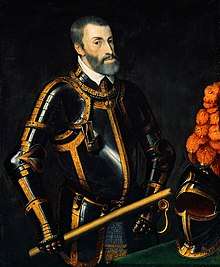Charles V, Holy Roman Emperor (Spanish: Carlos I, Dutch: Karel V, German: Karl V.) (February 24 1500 – September 21 1558) was effectively (the first) King of Spain from 1516 to 1556 (in principle, he was from 1516 king of Aragon and from 1516 guardian of his insane mother, queen of Castile who died 1555, and the co-king of Castile 1516–55, full king 1555–56), and Holy Roman Emperor from 1519 to 1556.
Quotes
- My life has been one long journey.
- As quoted at his last public speech.
- Fortune have somewhat the nature of a woman; if she be too much wooed, she is the farther off.
- As quoted in The Advancement of Learning (1605), Book II, by Francis Bacon
- Quot linguas calles, tot homines vales.[1][2]
- Translation: As many languages as you know, so many separate individuals you are worth.[1]
- Translation: As many languages as a man knows so many times he is a man.[2]
- Translation: The more languages you know, the more human you become. (A very loose translation but it seems to carry the spirit of the original.)
- I speak in Latin to God, Italian to Women, French to Men, and German to my Horse.
- Charles V may have said something in this general format, but not with this specific wording. Variants have been quoted for centuries, and the earliest known citation, itself a secondary source dating from 40 years after his death, gives two versions that both differ from the modern one. Girolamo Fabrizi d'Acquapendente's 1601 De Locutione gives:
- Unde solebat, ut audio, Carolus V Imperator dicere, Germanorum linguam esse militarem: Hispanorum amatoriam: Italorum oratoriam: Gallorum nobilem ("When Emperor Charles V used to say, as I hear, that the language of the Germans was military; that of the Spaniards pertained to love; that of the Italians to prayer; that of the French was noble").
- Alius vero, qui Germanus erat, retulit, eundem Carolum Quintum dicere aliquando solitum esse; Si loqui cum Deo oporteret, se Hispanice locuturum, quod lingua Hispanorum gravitatem maiestatemque prae se ferat; si cum amicis, Italice, quod Italorum dialectus familiaris sit; si cui blandiendum esset, Gallice, quod illorum lingua nihil blandius; si cui minandum aut asperius loquendum, Germanice, quod tota eorum lingua minax, aspera sit ac vehemens (Indeed another, who was German, related that the same Charles V sometimes used to say: if it was necessary to talk with God, that he would talk in Spanish, which language suggests itself for the graveness and majesty of the Spaniards; if with friends, in Italian, for the dialect of the Italians was one of familiarity; if to caress someone, in French, for no language is tenderer than theirs; if to threaten someone or to speak harshly to them, in German, for their entire language is threatening, rough and vehement").
- I will not blush like my predecessor Sigismund.
- This was supposedly said by Charles when Martin Luther appeared at the Diet of Worms (16 - 18 April 1521) under an imperial safe-conduct; members of the pro-papal party (sometimes Johann Maier von Eck is specified) are supposed to have urged the emperor to seize Luther in despite of the safe-conduct, whereupon Charles alluded to the story that when Jan Huss had appeared before the Emperor Sigismund under a similar safe-conduct and had been arrested anyway, Hus reproached Sigismund, who visibly reddened at his own lack of faith. The quotation appears in various similar forms, e. g., "I shall not blush as Sigismund did at Constance." The saying is attributed to Charles by the French ecclesiastical historian Jacques Lenfant in his Histoire du Concile de Constance (1714) without a specific source.
External links
- 1 2 John G. Robertson "Robertson's Words for a Modern Age: A Cross Reference of Latin and Greek Combining Elements": "Attributed to Charles V"
- 1 2 Ralph H. Orth "Journals and Miscellaneous Notebooks of Ralph Waldo Emerson, Volume VI: 1824-1838": "Charles V ap. Brantam"
This article is issued from
Wikiquote.
The text is licensed under Creative
Commons - Attribution - Sharealike.
Additional terms may apply for the media files.
